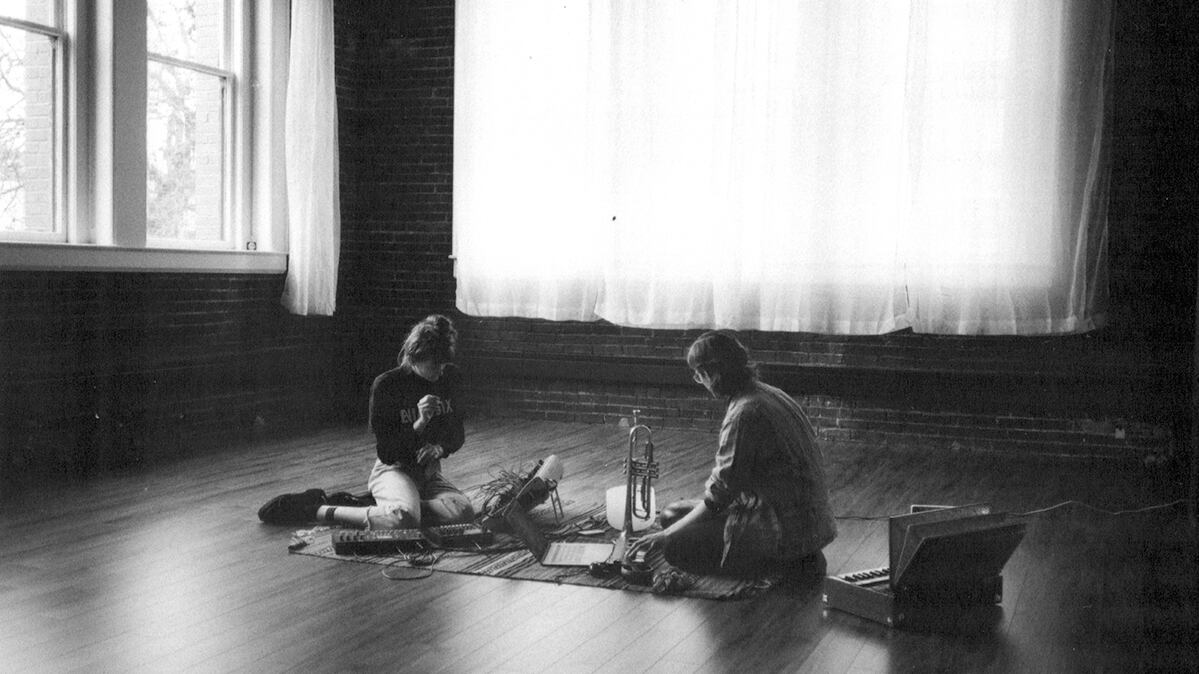Danielle Davis and Steven Whiteley can’t keep their hands off each other.
Over the course of an hourlong conversation, the two artists that make up the ambient electronic project Liila repeatedly embrace or lay hands on each other’s knees and shoulders.
It’s the kind of affectionate touch seen in new couples or between close family members.
However, Davis and Whiteley are neither.
“Our friendship is deeply intimate and romantic, even though we don’t have a sexual relationship,” Davis says. “We’re both interested in breaking the normative bounds of what it’s like to be a friend. I mean, we consider each other life partners, in many ways.”
The close relationship, cultivated since crossing paths three years ago in a Buddhist monastery, fed directly into the luscious, compassionate sound of their debut album, Soundness of Mind.
Whiteley was living in New Mexico when they spotted Davis’ modular synth in an Instagram post from Green Gulch Farm, a Zen center located just outside San Francisco. Hungry for the creative community they couldn’t find at the time, they took it as a sign and relocated there.
Davis spotted Whiteley instantly.
“It’s funny how social signifiers work,” Davis relates. “I saw their pant cut and was like, ‘Oh yeah, I want to hang out with them.’”
Both members identify as nonbinary and use they/them pronouns, further eradicating the distance between them.
But at that moment they were bumping into each other at the center’s snack table where they bonded over their mutual love of Pauline Oliveros: the late composer who created the meditative approach called Deep Listening.
The two were soon jamming in Davis’ yurt, where they quickly developed a creative and interpersonal harmony.
“When we’re connecting, both in music and in our life, it feels like our spirit beings are dancing in space,” Davis says.
“There’s this aspect of ourselves—as we’re really meeting each other. That’s what was developing [while we were] sharing the intimacy and intensity of living in a Zen center. I think a lot of very particular relationality developed in that setting; that then comes out in what we make together.”
The seven tracks on Soundness of Mind bear out Davis’ theory. There’s no clear delineation to reveal which musician is playing a particular instrument or creating a particular sound. The balmy drones, keyboard trills, and steely plucks of various acoustic instruments seem to come from everywhere—a blur of sound that is somehow both soothing and energizing. The album is also marked by a playfulness that’s reflective of the joy that is at the heart of Whiteley and Davis’ creative practice.
Soundness of Mind was developed when the pair relocated from Green Gulch to Great Vow Zen Monastery in Clatskanie.
Attracted to the community for both its monthly silent retreats and its openness to musical expression, the two got into a regular routine of practicing and performing.
It had an in-house marimba band and a gymnasium full of instruments. Plus, one of the monastery’s teachers, Jogen Salzberg, was also a DJ specializing in lush mixes of meditative sounds.
“His taste in ambient music is really obscure,” Whiteley says. “A lot of it is only vinyl and tape from before ‘90s. He’s a true weirdo audiophile.”
Some of the material they recorded during that period made its way onto Soundness of Mind. A truncated version of a 30-minute piece, composed of birdsong field recordings and Keith Jarrett-like piano improvisation became the track “Not One Not Two.”
Whiteley and Davis also spent some time together in Joshua Tree, Calif. “We did another very cliché thing,” Davis says. “We rented a cabin, took psychedelics and wrote music.”
What comes out of spending time with Soundness of Mind is a sense that Whiteley and Davis have—through psychedelics, meditation or music—glimpsed a hopeful future.They’ve seen a time when technology and humanity can comfortably coexist, and they’re already living in a place where two nonbinary musicians can have an intense connection and an intimate relationship that goes far beyond heteronormativity.
When the pair finally moved to Portland, they shared the same room and the same bed in a small house for five months, coordinating with one another their lives and liaisons with their respective partners.
“It was very, very cute and funny,” Davis says. “We really got to know each other. [Stephen] has seen all corners of myself, and somehow they still seem to love me.”
The two share a giggle and a knowing glance.
“I mean,”Whiteley says, “likewise.”
